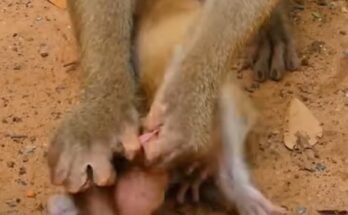The act of a mother monkey giving birth and then showing violent or harmful behavior toward her offspring, such as killing or rejecting the baby, can be a rare and distressing occurrence. Such incidents, while troubling, have been observed in primates under specific circumstances. Below is a detailed explanation of this behavior and the potential factors behind it.
The Birthing Process
The birth of a baby monkey is usually a natural and instinct-driven process. The mother monkey undergoes labor and delivers the infant, which she instinctively cleans and nurtures. In normal cases, the newborn forms an immediate bond with the mother, who nurses and protects it. This bond is critical for the infant’s survival, as primate babies are entirely dependent on their mothers in the early stages of life.
When Violence Occurs: Possible Triggers
In some cases, however, a mother monkey may display uncharacteristic aggression toward her newborn, including abandonment, neglect, or even infanticide (the killing of the baby). While such behavior is not the norm, it can happen for several reasons:
- Stress or Poor Environment
Monkeys are highly sensitive creatures. A stressful environment, including overcrowding, insufficient resources, or loud disturbances, can create anxiety in the mother. This stress may interfere with her maternal instincts, leading to neglect or aggression. - Illness or Birth Defects in the Infant
Sometimes, the mother may perceive the baby as weak, sick, or deformed. In the wild, this perception might be a survival mechanism, as raising an unhealthy offspring could strain her resources and reduce her chances of successfully raising future young. - Inexperience in First-Time Mothers
Young or first-time mothers may lack the experience to care for a newborn properly. Without knowing how to respond to the baby’s cries or movements, they might panic and act aggressively. - Hormonal Imbalances
The birthing process triggers hormonal changes that encourage maternal behavior. In rare cases, these hormones might not function as expected, preventing the mother from bonding with her baby. - Scarcity of Resources
In environments where food, water, or shelter is scarce, a mother monkey may prioritize her survival over that of her baby. This brutal decision, while instinctual, reflects the harsh realities of survival in the wild.
Ravaging or Killing the Infant
Infanticide, though rare in maternal behavior, has been documented in primates. The mother may reject the baby outright, refuse to nurse it, or, in extreme cases, fatally harm the infant. Such actions often result from a combination of the above factors.
Broader Behavioral Context
This phenomenon is not limited to monkeys. In many animal species, including primates, infanticide or neglect can occur under extreme conditions. Understanding this behavior requires considering the mother’s mental and physical state, her environment, and the social structure of her group.
Conservation Implications
In captivity, caregivers closely monitor pregnant monkeys and their newborns to prevent such tragedies. Efforts are made to provide a stress-free, enriched environment and intervene if necessary to ensure the baby’s safety. In the wild, however, nature follows its course, sometimes in ways that may appear cruel but serve evolutionary purposes.
Such events remind us of the complexity of animal behavior and the challenges faced by wildlife in both natural and human-altered environments.


